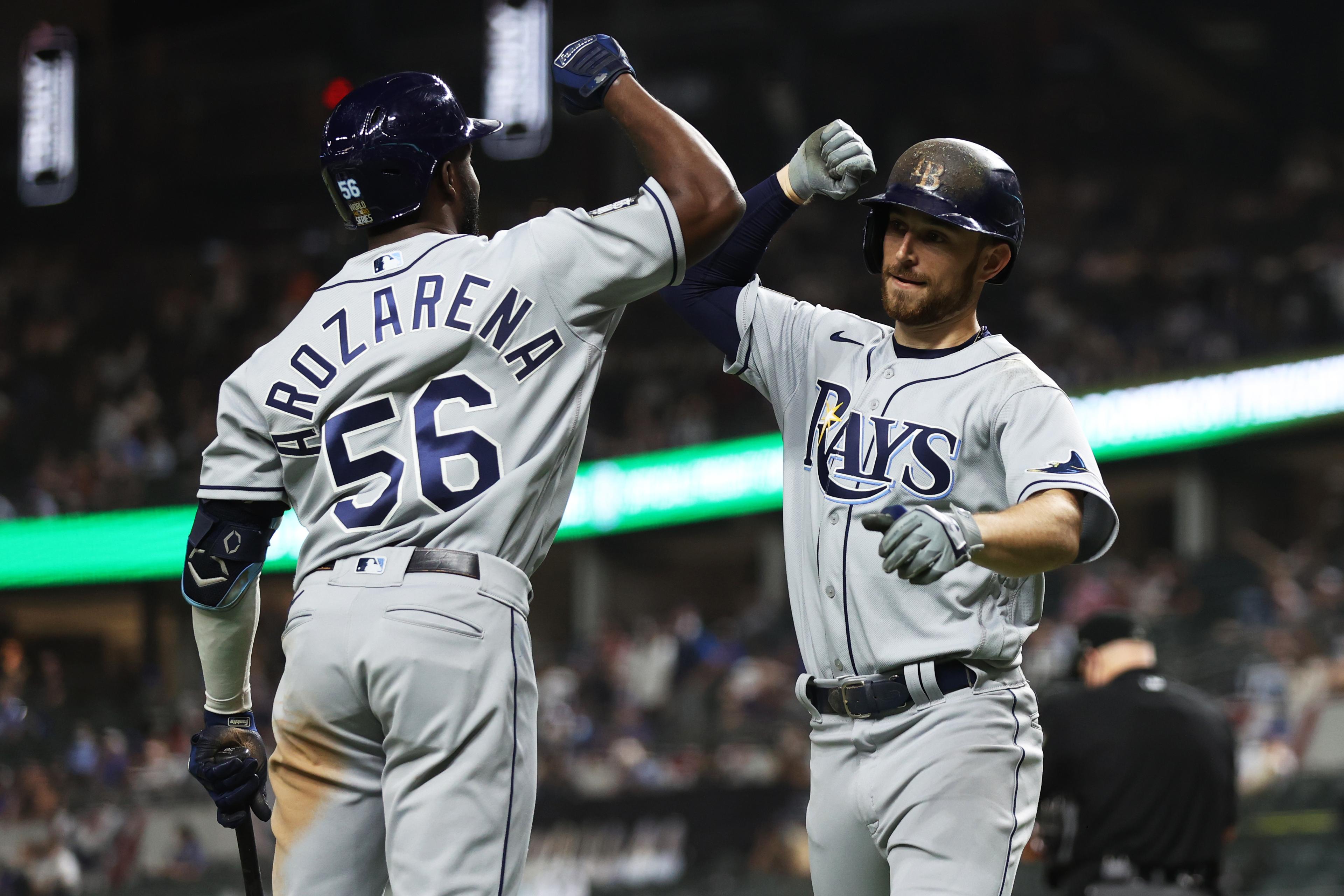
The Dodgers took Game 1 of the 2020 World Series by following the steps they used to win an MLB-best 43 games this season. The celebrated starting pitcher delivered a solid outing. The majors’ highest-scoring offense drew seven walks and scored eight runs. And the team with the best per-game run differential since 1939 cruised to a five-run victory, not even needing a closer.
But while the Dodgers were the National League’s best team this season, the Rays were the AL’s no. 1 seed for a reason, and they executed their own winning formula Wednesday. Thanks to a crucial return to form from an offensive centerpiece and reliable innings from a deep pitching staff, the Rays took Game 2, 6-4. As expected with two teams of this caliber, a lengthy series looks to be in store.
The Rays’ reversal of fortunes began early in Game 2, a pleasant turn for the team that had the best record in the majors when scoring first. Unlike the Dodgers, the Rays don’t have any bona fide batting stars, but they have sufficient depth that any one player can step up and carry the lineup for a game. Some days—most days this postseason, frankly—that offensive star has been Randy Arozarena. Other times it’s been Ji-Man Choi, or Mike Zunino, or Mike Brosseau off the bench.
One player who hadn’t yet assumed that role was Brandon Lowe, the Rays’ best hitter in the regular season. The second baseman slashed .269/.362/.554 this year, good for a 150 wRC+—meaning he was 50 percent better than league average, after adjusting for home park. That advanced figure was one point higher than those of Mookie Betts and Fernando Tatis Jr.
Yet entering Wednesday’s game, Lowe was hitting just .107/.180/.161 this postseason, with one extra-base hit in 15 games. Any batter can struggle over a 56-at-bat sample, but Lowe’s poor numbers stood out because of both the stage and his prominence in the lineup. Kevin Cash kept slotting Lowe into the no. 2 spot in the Rays’ order, telling reporters before Game 2 about Lowe and leadoff man Austin Meadows, “We recognize that they’re scuffling, it hasn’t come easy for ’em. But for better or worse, we’re going to stick with the guys that we’ve got a lot of faith in.”
Lowe repaid that faith early and often in Game 2. In the first inning, he smashed a 410-foot homer to left-center; in the fifth, he snuck another opposite-field homer against Dustin May, pushing the Rays’ lead to 5-0.
The Rays’ other two early runs came after Dodgers second baseman Enrique Hernández briefly bobbled a grounder, preventing an inning-ending double play. Afforded an extra out, the Rays capitalized via a Manny Margot single against the shift and a two-run Joey Wendle double.
Staked to a sufficient lead, the Rays’ bullpen took its turn in the spotlight. Starter Blake Snell enjoyed a dominant early performance, reaching the two-out mark in the fifth inning without permitting a hit, but he fell apart quickly, allowing a walk, two-run homer, walk, and single in succession. Cash wasn’t quick enough to relieve Game 1 starter Tyler Glasnow—a rare misstep from the strategically sound manager—but he didn’t let Snell toil any longer. Nick Anderson trotted in from the bullpen, and the Rays began charting their path to the 27th out.
Anderson has been the best or second-best reliever in the majors since joining Tampa Bay in a midseason trade in 2019. He’s not just effective on a per-inning basis; he’s also comfortable throwing multiple innings and entering in any situation. In his brief playoff career, he’s already relieved in the third, fourth, fifth, sixth, seventh, eighth, and ninth innings.
Anderson struggled against the Astros in the ALCS, allowing at least one run in all three games he pitched and not striking out a single batter. His 0.55 regular-season ERA had ballooned to 4.63 this postseason. But as with Lowe, Cash kept faith with the talented players who delivered the Rays to the World Series. And although Anderson extended his runs-allowed streak to five games on Wednesday via a solo Will Smith home run, he looked sharp otherwise. Anderson stranded both of Snell’s runners in the fifth by whiffing Justin Turner, then rang up pinch hitter Edwin Ríos to end the sixth.
Triple-digit tosser Pete Fairbanks followed Anderson, allowing a solo home run of his own—Corey Seager’s been on fire so long the situation is growing dangerous—but also securing five more outs. Then came southpaw Aaron Loup to retire some lefties, and finally Diego Castillo to close the game with a one-out save.
The Rays’ bullpen isn’t nearly as regimented as other successful bullpen chains, like the Reds’ Nasty Boys or the Royals’ HDH trio. Cash doesn’t have a “6-2-1” plan like that employed by the mid-’90s Yankees, in which the starter would throw six innings, then-setup man Mariano Rivera would bridge two innings to the ninth, and closer John Wetteland would handle the rest.
But what the Rays relievers lack in specific structure they more than compensate for with depth and flexibility, as players ranging from the rookie Fairbanks to the veteran Loup contributed key outs in Game 2. No bullpen was more valuable than the Rays’ in the regular season, and Cash can finally double down on using his best relievers in the World Series—the first playoff round in 2020 to include off days. With no game on Thursday, the top three Rays relievers will all be rested for Game 3, and with Cash reluctant to use them when the opposition has a lead, they’ll remain fresh when needed to secure victories throughout the series.
Game 2 provides clear evidence: This formula works. The Rays can’t outslug the Dodgers game after game, but they don’t need to. If one hitter supplies a few runs, the majors’ best pitching staff can do the rest. This series should go on for a while, and the Rays might have three more low-scoring wins left in them.

